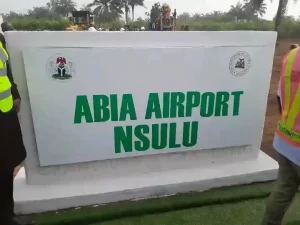OPINION
A Stain On The Tarmac: The Fraudulent Acquisition Of Nsulu Land For Abia Airport

By ‘Bike Ogbonnaya*
The promise of progress frequently comes at a cost, but when that cost is the violation of fundamental rights and flagrant disregard for the law, it becomes a stain on the very progress it purports to represent.
This is precisely what is happening in Nsulu, Abia State, where the alleged acquisition of land for the Abia Airport has sparked a firestorm of controversy, leaving landowners feeling betrayed and stripped of their constitutional rights. This is more than just a local land dispute; it tests the rule of law and the Abia State Government’s commitment to equitable land administration.
The passionate petition penned by the Nsulu customary landowners of Umunkolo. Okpuala, Umulenwa Umuezenta, Umuala meticulously outlines a series of alleged violations of the Land Use Act, 1978 (as amended) and the Constitution of the Federal Republic of Nigeria 1999 (As Amended), raising serious concerns about the legitimacy and fairness of the entire acquisition process.
Their grievances are more than just procedural quibbles; they go to the heart of property rights, due process, and the government’s obligation to act in good faith.
The landowners’ main argument is that the acquisition process is allegedly opaque. Section 28(1) of the Land Use Act authorises the Governor to revoke a right of occupancy for “overriding public interest,” but this authority is not unlimited. It requires transparency and specificity. The landowners claim they were never informed about the actual size, survey plan, or geographic boundaries of the land being acquired.
This lack of clarity not only violates the spirit of the law but also exposes landowners to risk and renders them unable to effectively protect their interests. How can one challenge an acquisition when the exact boundaries of what is being taken are unknown? This opacity breeds suspicion and undermines the legitimacy of the entire process.
Furthermore, the Land Use Act states that landowners are entitled to compensation for unfinished improvements on their property, such as economic trees, crops, and buildings. However, the Nsulu landowners claim that no proper enumeration or valuation occurred in their presence.
This directly contradicts Section 29(2)(a) of the Act, which requires compensation to be determined fairly and justly. The lack of a transparent and participatory valuation process raises the possibility of undervaluation and unjust enrichment on the part of the acquiring authority. It is a betrayal of the trust placed in the government to act as an impartial arbiter in such cases.
Perhaps the most damning allegation is that community members were coerced into signing indemnity forms without knowing the actual compensation amount or the document’s legal implications. This blatant disregard for informed consent violates Section 44(1) of the 1999 Constitution, which prohibits the compulsory acquisition of property without adequate compensation and due process. This is simply a land heist. Forcing people to sign documents under duress without giving them the opportunity to seek legal advice or even read the contents is not only morally wrong but also legally untenable. It undermines the fundamentals of a just and equitable legal system.
The landowners correctly point out that Section 1 of the Land Use Act grants land to the Governor “in trust and for the use and common benefit of all Nigerians.” This fiduciary duty requires fair consultation and engagement with landowners, ensuring that their rights and interests are protected throughout the acquisition process.
The absence of a Memorandum of Understanding (MoU) with the actual customary landowners constitutes a fundamental breach of this trust. It implies a deliberate attempt to undermine legitimate representation and impose the government’s will on a vulnerable community.
The right to a fair hearing and legal representation is an essential component of any democratic society. Section 36 of the 1999 Constitution protects this right, which must be upheld in all government actions, including land acquisition.
The landowners’ claim that they were denied the opportunity to consult with legal counsel before signing important documents is a serious violation of this fundamental principle. It denies them the ability to understand their rights and options, placing them at the mercy of the acquiring authority.
The Nsulu landowners’ demands are not unreasonable; they represent a call for justice and fairness. They have asked the Abia State Government to:
Immediately suspend all activity on the acquired land pending proper legal and procedural compliance. This is an important step towards preventing further injustice and allowing for a thorough review of the acquisition process.
Maintaining the status quo, especially in the face of credible allegations of wrongdoing, only serves to exacerbate the harm that has already occurred. Furthermore, the landowners claim that the issues are already before a court with competent jurisdiction, necessitating a halt in activity.
Provide accurate maps and measurement details of the land that is supposed to be acquired. Transparency is paramount. The landowners have the right to know exactly what land is being taken and how it will be used. This information will allow them to effectively assert their rights and, if necessary, challenge the acquisition.
Conduct a new, transparent, and participatory enumeration and valuation exercise, involving the actual landowner: A fair and impartial valuation process is required to ensure that landowners receive appropriate compensation for their losses. This process must take place in the presence of the landowners, with their full participation.
Disclose all purported documents signed and the amounts involved: Transparency is again essential. The landowners have the right to know what documents they signed and the amounts of compensation offered. This information is critical for them to make sound decisions about their future.
Provide a new, fair compensation process in which landowners are given time and access to legal advice. Landowners should be given plenty of time to weigh their options and seek legal counsel before accepting any compensation offer. They should not be forced or coerced into signing agreements they do not fully understand.
Enter into a valid Memorandum of Understanding with actual landowners, not a procured representative. To protect Nsulu landowners’ rights and interests, the government must engage directly with their legitimate representatives.
The Abia State Government is responsible for upholding the provisions of the Land Use Act and the Federal Republic of Nigeria’s Constitution. Failure to do so will not only erode public trust, but will also foster an atmosphere of instability and unrest.
The acquisition of land for the Abia Airport should be a symbol of progress and development, rather than a source of injustice and resentment. The government must act quickly and decisively to address the concerns raised by Nsulu landowners and protect their rights.
This situation necessitates more than mere lip service to the rule of law. It requires a genuine dedication to transparency, accountability, and fairness. The Abia State Government must demonstrate a willingness to listen to its citizens’ concerns, respect their property rights, and follow natural justice principles. Failure to do so will leave a permanent stain on the tarmac of Abia Airport, serving as a stark reminder of the cost of progress when fundamental human rights are sacrificed.
The case of the Nsulu landowners is a cautionary tale for other communities facing similar challenges. It emphasises the value of vigilance, organisation, and unwavering advocacy in the face of government overreach. It also emphasises the importance of the judiciary in protecting the rights of vulnerable citizens from abuse of power. The courts must be willing to hold the government accountable and ensure that the Land Use Act and the Constitution are followed in letter and spirit.
The resolution of this dispute will have far-reaching consequences for land administration in Abia State and elsewhere. It will send a clear message as to whether the government is truly committed to upholding the rule of law and protecting citizens’ rights. The nation’s attention is focused on Abia State, and the government’s response to the plight of the Nsulu landowners will be a watershed moment in history. The question remains: will the promise of progress be based on justice and fairness, or will it be tainted by the violation of fundamental rights?
Only time will tell.
*Ogbonnaya, journalist and media consultant writes from Lagos
-
CRIME3 years ago
PSC Dismisses DCP Abba Kyari, To Be Prosecuted Over Alleged $1.1m Fraud
-
FEATURED4 years ago
2022 Will Brighten Possibility Of Osinbajo Presidency, Says TPP
-
FEATURED2 years ago
Buhari’s Ministers, CEOs Should Be Held Accountable Along With Emefiele, Says Timi Frank
-
BUSINESS & ECONOMY2 years ago
Oyedemi Reigns As 2023’s Real Estate Humanitarian Of The Year
-
SPORTS1 year ago
BREAKING: Jürgen Klopp Quits Liverpool As Manager At End Of Season
-
SPORTS2 years ago
Could Liverpool Afford Kylian Mbappe For €200 million? Wages, Transfer Fee
-
ENTERTAINMENT2 years ago
Veteran Nigerian Musician, Basil Akalonu Dies At 72
-
FEATURED2 years ago
Tribunal Judgement: Peter Obi Warns Of Vanishing Electoral Jurisprudence, Heads To Supreme Court
-
BUSINESS & ECONOMY2 years ago
Oyedemi Bags ‘Next Bulls Award’ As BusinessDay Celebrates Top 25 CEOs/ Business Leaders
-
FEATURED3 years ago
2023 Presidency: South East PDP Aspirants Unite, Demand Party Ticket For Zone

































